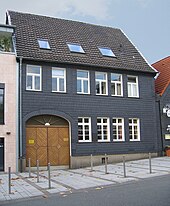Friedrich Leopold Woeste
Johann Friedrich Leopold Woeste (born February 15, 1807 in Niederhemer , † January 7, 1878 in Iserlohn ) was a German linguist and dialect researcher.
Life
Friedrich Leopold Woeste was the eldest of eight children of elementary school teacher Johann Ludolf Leopold Woeste and his wife Maria Katharina Woeste, née. Kruse. Woeste received lessons in history, geography, Latin and French at an early age. At the instigation of his teacher Pastor Wulfert, his parents sent him to the grammar school in Elberfeld , where he lived with his mother's relatives. From 1822 to 1826 Woeste was a student at the Francke Foundations in Halle , which he left with the best possible diploma. From 1826 to 1829 he also studied theology in Halle and simultaneously learned Greek and Hebrew. In 1832 he passed a preacher's exam in Münster , although later he never tried to hold a ministerial office.
From 1829 he taught at a private school in Hemer and worked as a private tutor in Altena . During this time he also began studying Low German and explored the flora and fauna of the Hemer area. In 1839 he moved to Iserlohn , where he lived and worked as a private scholar, tutor and private tutor. He wrote correspondence in foreign languages for some merchants. In 1849/50 he was a teacher of modern languages at the Higher City School in Iserlohn (later Märkisches Gymnasium ). Woeste was able to speak and teach eight languages ( German , English , French , Italian , Dutch , Danish , Swedish and Spanish ) fluently. In the 1860s he also worked for the scientific journal “Germania” and various dictionaries.
Due to illness, the unmarried Woeste moved in with his sister in 1877 before he died there in January 1878 of a breast disease. He was buried in the municipal cemetery in Iserlohn, where the tombstone can still be found today.
plant
Woeste has written many essays and articles on etymology , local history and legends. His “Dictionary of the Westphalian Dialect”, published in 1882 as the result of 40 years of research and collecting activity, is of particular value, which in addition to the Westphalian and especially the Brandenburg vocabulary also contains proverbs and thus references to folk customs. But his other research is also valuable for the Low German dialect . Further works are published in "Sagen, Gebräuche und Märchen aus Westfalen" (Leipzig 1859) by Adalbert Kuhn and "Germaniens Völkerstimmen 1841-66" by Johann Matthias Firmenich-Richartz . Thanks to his knowledge of European languages, Woeste was primarily able to apply comparative linguistics . For his services Woeste was accepted into the Berlin "Society for German Language".
The private school for higher education he founded in Hemer in 1829 was a forerunner of the Friedrich-Leopold-Woeste-Gymnasium, which was later named after him . A primary school near the house where he was born also bears his name.
Fonts
- Johann Friedrich Leopold Woeste: Folk traditions in the county of Mark together with a glossary . Iserlohn, 1848 (digitized version)
- Friedrich Woeste: Dictionary of the Westphalian dialect . Leipzig, 1882 (digitized)
- Literature by and about Friedrich Leopold Woeste in the catalog of the German National Library
literature
- Heinrich Kleibauer: Johann Friedrich Leopold Woeste. in: Bürger- und Heimatverein Hemer eV (Hrsg.): The key. Hemer 1957. pp. 1-7
- Edward Schröder : Woeste, Friedrich . In: Allgemeine Deutsche Biographie (ADB). Volume 43, Duncker & Humblot, Leipzig 1898, p. 706 f.
Web links
| personal data | |
|---|---|
| SURNAME | Woeste, Friedrich Leopold |
| ALTERNATIVE NAMES | Woeste, Johann Friedrich Leopold |
| BRIEF DESCRIPTION | German linguist |
| DATE OF BIRTH | February 15, 1807 |
| PLACE OF BIRTH | Hemer |
| DATE OF DEATH | January 7, 1878 |
| Place of death | Iserlohn |


